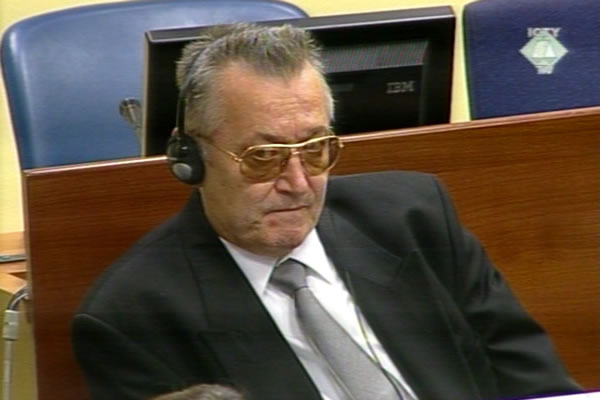Home
SAFEGUARDING ‘AUTONOMY’ OF SERBS OUTSIDE SERBIA
Franko Simatovic’s police expert says that the Serbian State Security Service was obliged by the Serbian Constitution to act to ‘protect the national, cultural and historical autonomy’ of Serbs outside Serbia. This supports the defense’s argument that when the accused was in Krajina in the early 1990s he was acting within the powers given to him by the law, gathering intelligence to protect the interests of Serbia and of the Serbs in Krajina
 Franko Simatović u sudnici Tribunala
Franko Simatović u sudnici Tribunala Milan Milosevic, a teacher at the Police Academy in Belgrade, continued his evidence in Franko Simatovic’s defense. Today, Milosevic spoke at length about the involvement of the Serbian State Security Service in protecting the Serbs outside Serbia, the issue he raised yesterday. Milosevic quoted a provision from the 1990 Serbian Constitution, which imposed an obligation to maintain ties with the Serbs outside Serbia in order to ‘protect their national, cultural and historical autonomy’.
This provision was more or less copied in the 1992 Service manual, which stipulates that the service and its staff, including ‘an employee’ of the Second Administration Franko Simatovic, were tasked with protecting ‘the national, cultural and historical autonomy’ of the Serbs outside Serbia. The defense wants to prove that Simatovic’s involvement in Krajina in the early 1990s was in line with the Constitution, the law and the Service rules.
The indictment alleges that Franko Simatovic and the chief of the Serbian State Security Service Jovica Stanisic were involved in preparing the Serbs in Croatia for the war. According to the indictment, Simatovic and Stanisic established, armed, trained and controlled the police units which committed many crimes against civilians in the wars in Croatia and BH. The defense contends that Simatovic was in Krajina in early 1990s only to collect the intelligence to protect the interests of Serbia and of the Serbs in Croatia. The police expert explained today that the Serbian State Security Service personnel were engaged in ‘offensive intelligence work’: this meant gathering intelligence in the territory of a foreign country using various methods including surveillance.
In his detailed theoretical analysis of the way the service worked, the witness notes that according to the Serbian law a court order was required for surveillance. The presiding judge asked the witness if a court order was necessary for surveillance in the territory of another country, which is what the defense contends Simatovic did in Krajina. Milosevic said the law required it, but he didn’t know what the practice was. When the judge remarked that the witness spoke only about the theory, and didn’t really know if ‘the rules kept abreast with practice’, the witness replied that in Serbia there ‘was great fear and wariness’ of unauthorized surveillance ever since 1966, when it was discovered that the interior minister Aleksandar Rankovic had put president Tito under surveillance. This is why the witness believed that the Serbian State Security Service ‘would never’ carry out surveillance without a court order.
Based on what he had seen in the documents, the witness concluded that Franko Simatovic, as a senior inspector in the Second Administration, was ‘of a relatively low rank’ in the service. The witness contends that Simatovic was not the commander of the Red Berets unit because he signed a document of the unit ‘in the name of the deputy commander’. As the witness contended, this means that Simatovic was not even a deputy commander, much less the commander of the unit.
Simatovic’s defense witnesses are usually cross-examined by Stanisic’s defense first. Today this order was changed and at the end of the hearing, the prosecutor started cross-examining Milosevic.
Linked Reports
- Case : Stanisic & Simatovic
- 2012-05-01 ‘INTEGRATIVE CHARACTER’ OF MUP AND SERBIAN STATE SECURITY SERVICE
- 2012-04-20 PROSECUTION AND STANISIC’S DEFENSE DON'T AGREE OVER MLADIC’S DIARIES
- 2012-03-29 STANISIC AND SIMATOVIC TRIAL ADJOURNED FOR A MONTH
- 2012-05-03 STATE SECURITY PERSONNEL HAD FICTIONAL ASSIGNMENTS IN KOSOVO WHILE THEY SERVED IN KRAJINA AND BH
- 2012-05-08 SECRET POLICE DID NOT INTERFERE IN POLITICS
- 2012-05-09 THE ORIGINS OF ‘RED BERETS’
